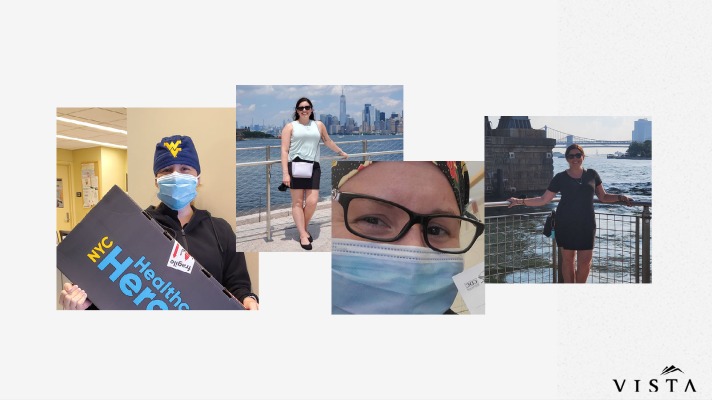Mandatory Vaccination Policies: What to Know and What to Do

With the rise in COVID-19 variants, many healthcare systems are mandating that all employees comply with vaccination policies. However, staff members exposed to coronavirus patients pose too high a risk to other patients, fellow employees, themselves, and their families to keep a hospital fully functional, so administrators are making the difficult decision to call for a fully vaccinated staff.
Some healthcare providers are not on board with the mandate citing not enough data and a rushed process. Many physicians are declining jobs that require vaccinations or leaving the field altogether.
Here’s a guide on what to expect and what you can do as a clinician dealing with vaccination mandates.
Can employers legally require vaccinations?
As COVID-19 variant cases climb, medical institutions around the country are requiring shots. However, some healthcare employees feel that it is illegal for an employer to make such a mandate.
Despite dozens of question-and-answer sessions and educational videos explaining the science behind the vaccine and its rapid production, some physicians remain wary, citing fears of what could happen down the line. Some hospitals that are already short-staffed are taking this into account and holding off on mandates. They fear that imposing a mandate could be the tipping point for losing more workers if they force the issue.
According to the Equal Employment Opportunity Commission (EEOC), an employer can legally require vaccinations for staff to continue to work there. Vaccination requirements do not violate the Americans with Disabilities Act or other federal employment laws. Exceptions do come with disabilities or religious beliefs that prohibit vaccinations. Workers who refuse to comply must submit to a rigorous regiment of testing, mask-wearing, and social distancing, or face losing their jobs.
Why are physicians hesitant?
Clinicians and medical staff have seen how ill patients become with coronavirus. Still, some of them choose not to take the vaccine. The hesitancy comes because the vaccine has not gone through enough testing and only one has been fully approved by the FDA.
According to the Johns Hopkins University of Medicine, a typical vaccine development takes 5 to 10 years or longer to assess its safety and effectiveness. Stages of development include exploration, a pre-clinical stage, clinical development, regulatory review and approval, manufacturing, and quality control. Clinical development is a three- or four-stage process with various groups of people receiving the trial vaccine.
During the pandemic, the vaccine development timeline has been accelerated. Some clinical trial phases were combined, and since cases accumulate rapidly, efficacy can be tested more quickly. Manufacturing capacity scaled up.
Before a vaccine can be tested on humans, it must be approved by the FDA. So far, emergency approval has been granted for the three available vaccines, but full FDA approval has only been issued for one. Rapid development and pending FDA approval have prevented certain healthcare system administrators and physicians from feeling comfortable getting the vaccines themselves. They want more time to learn the long-term effects.
What are physicians’ rights when it comes to mandatory COVID vaccines?
There are few or no legal barriers to hospitals requiring all staff members to be vaccinated. For example, one hospital that announced mandatory COVID-19 vaccinations for physicians, clinicians, and employees stated that vaccinations must happen by a specific date. Those who do not meet the requirement by that date would be put on an up to 30-day suspension until they received the vaccine. After that time, the employee would be terminated if they still were not vaccinated.
Clinicians must be informed of the option to accept or refuse vaccination and the consequences of that decision. They must also be provided with any acceptable alternatives and their benefits or risks.
What legal exemptions are available?
Hospitals have an ethical obligation to protect physically vulnerable people from COVID-19. Choosing to require that those who come into contact with patients and other employees be fully vaccinated falls beneath that obligation. If there are no state or local laws in place that specifically permits or prohibits vaccine mandates, determining the legality of such requirements for keeping a job will likely come down to future court decisions.
Clinicians can be legally exempted from the mandate if they have been diagnosed with one of the conditions the Center for Disease Control has considered a contraindication for their vaccine program. These include a severe allergic reaction to a previous dose or a vaccine component and conflicts with religious beliefs or practices. Supporting materials must be provided for exemption, and reasonable accommodations must be made for the exempted clinician.
For example, Mayo Clinic’s vaccination policy states that staff is expected to be fully vaccinated or participate in a declination process. Staff members who decline to be vaccinated for COVID-19 must complete education modules and will be required to wear masks and socially distance when on campus.
Partner with VISTA
While many hospitals are requiring mandatory COVID-19 vaccinations for clinicians and other staff members, not all medical organizations are following suit. With over 30 years of experience placing clinicians, a VISTA recruiter can identify locations where clinician services are most needed and they feel comfortable working.
Partner with a VISTA recruiter today to find a position that is right for you.









